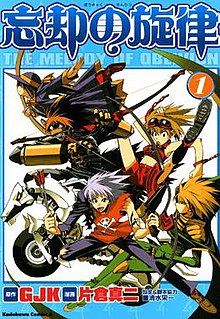Melody of Oblivion
| Melody of Oblivion | |

Cover of the first manga volume
|
|
|
忘却の旋律 (Bōkyaku no Senritsu) |
|
|---|---|
| Manga | |
| Written by | Shinji Katakura |
| Published by | Kadokawa Comics |
| Demographic | Shōnen |
| Magazine | Shōnen Ace |
| Original run | 2003 – 2004 |
| Volumes | 6 |
| Anime television series | |
| Directed by | Hiroshi Nishikiori |
| Music by |
Yoshikazu Suo Hijiri Kuwano |
| Studio | J.C. Staff, Gainax |
| Licensed by | |
| Original network | TBS |
| Original run | 6 April 2004 – 21 September 2004 |
| Episodes | 24 |
The Melody of Oblivion (忘却の旋律 Bōkyaku no Senritsu?) is an anime series produced by Gainax and animated by J.C. Staff. The series is 24 episodes long, and originally aired between April 7, 2004 and September 21, 2004.
The Melody of Oblivion is a series rife with cultural references ranging from Zen archery and Bushido to the Bible's Book of Revelation, stories of Greek Mythology, and images from Borge's "The Garden of Forking Paths" can be seen in the series.
Melody of Oblivion's premise is that in the 20th century, humanity waged and lost a war against beings known only as the Monsters. In the 21st century, the Monsters rule the earth, but they have reconstructed society such that virtually no one born after the war ended is aware that it ever happened. Children are disappearing mysteriously. Only the Warriors of Melos are still fighting against the Monsters. The series focuses on Bocca, a teenager who chooses the path of the Warrior. In doing so, he gains the power to fight back at the horrors he sees, but it costs him his place in society.
Melos Warriors are the only ones who can see the ephemeral "Melody", personified as a girl who appears at important times and shows emotion but does not speak. The Melos, as they are also referred to, fight primarily with bows and arrows infused with the energies of their spirit (seemingly described in Italian words and phrases used in musical notation). The visible marks (Sacred Scars) that they employ in this infusion process appear as tattoos on their person.
The Melos Warriors are aided by devices called Aibar machines (could also be transliterated as Aiba-Machine), which are essentially futuristic motorcycles with many additional capabilities. ('Aiba' or 'Aibar' are transliterations for a word in Japanese meaning 'Favorite Horse.') The process of bonding a Warrior of Melos and an Aibar machine involves a symbolic naming of the bike by the one who is to ride it. Thereafter, the Aibar machine follows voice commands. All Aibar machines are at least minimally sentient, while some possess fully human-like intelligence. As such, they can function mostly or completely independently of their drivers when need be.
...
Wikipedia
